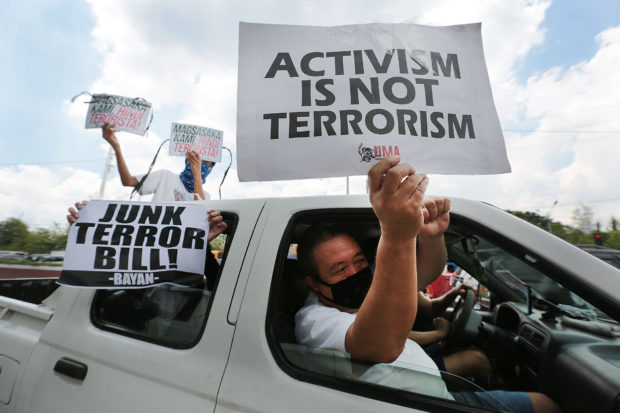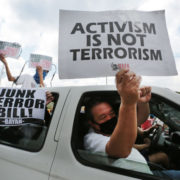
PHILIPPINE Senate President Vicente Sotto III on Monday, July 6 dismissed the number of petitions filed before the Supreme Court challenging the newly-signed Anti-Terrorism Act of 2020.
“I do not think SC justices can be [intimidated] by anyone or the number of petitions,” Sotto said in a tweet.
“It’s about content! So you are filing? Be my guest!” he added.
Sotto is one of the principal authors of the measure in the Senate.
According to him, most of the critics have misinterpreted the law.
“The points vs the [anti-terrorism law] are not correct,” Sotto told INQUIRER.net.
“The SC is not known to entertain cases for declaratory relief unless there is [an] actual case of a person affected by the law,” he added. “[W]hen I said be my guest. It’s to indicate [that] democracy is at work.”
Four petitions have been filed before the high court since President Rodrigo Duterte signed the measure into law on Friday, July 3.
A group of lawyers on Saturday, July 4, electronically filed a petition seeking the issuance of a temporary restraining order and a writ of preliminary injunction to stop the law’s implementation.
“[We] respectfully pray that judgment be rendered by the Honorable Supreme Court issuing a Temporary Restraining Order, Writ of Preliminary Injunction and/or Other Injunctive Remedies to prevent the enforcement of the anti-terrorism act beginning July 19, 2020, the same having been published in the Official Gazette on July 3, 2020,” the group, led by law professor and lawyer Howard Calleja, said.
Other petitioners included lawyer Joseph Peter Calleja, law professor Christopher John Lao, Reynaldo J. Echavez, Napoleon Siongco, Raeyan Reposar, civic groups Tunay na Bayani and Bagong Siklab Pilipinas, and former Education Secretary Bro. Armin Luistro.
Three new petitions were filed on Monday by Law Dean Mel Sta. Maria and several professors of the Far Eastern University (FEU), Rep. Edcel C. Lagman, and the Makabayan bloc in the House of Representatives led by Bayan Muna Party-List Rep. Carlos Isagani Zarate.
The FEU petition seeks to declare Sections 4, 5, 6, 7, 8, 9, 10, 11, 12, 25, 26, 27, and 29 unconstitutional.
“The definition of terrorism in Section 4 is so vague and broad such that it can be read to include legitimate and lawful gatherings and demonstrations where people assemble to exercise their freedom of speech, of expression, and of the press,” the petition read.
The FEU professors also told the SC that the provisions “attempted to legitimize warrantless arrests on the basis of mere suspicion, and for encroaching on exclusively judicial power and prerogative.”
They likewise noted that Sections 25 and 29 “completely disregard and violate Article III, Section 2 of the fundamental law by supplanting the Constitutional requirements before an individual may be arrested and deprived of liberty, namely a judicially issued warrant of arrest and the stringent requisites for a lawful warrantless arrest.”
Meanwhile, Lagman’s petition said “the war against suspected terrorists and the campaign against terrorism cannot be pursued and intensified by sacrificing human rights, civil liberties, and fundamental freedoms which are enshrined in and protected by the Constitution.”
The petition also noted that “the redefinition of the crime of terrorism is cast in vague and ambiguous language so much so that there is no certitude on what acts are proscribed and the people are perplexed on what acts to avoid.”
“A maximum of 90 days technical surveillance and wiretapping of communications is an unreasonable invasion of a person’s privacy which is guaranteed by the Constitution,” it added.
Makabayan’s petition, on the other hand, seeks the declaration of the law in its entirety as violative of the Constitution.
According to the bloc party, the broad definitions will give “too much leeway” to charge progressive individuals as well as others who dare express dissent.
“The overbroad and vague provisions on extensive, interference, damage or destruction, and critical infrastructure will give the implementors of the Anti-Terrorism Act of 2020 much leeway to charge these vulnerable speakers for terrorism,” said Makabayan in its petition.
Malacañang, for its part, said it will abide by the SC’s ruling on petitions against the anti-terror law.
“The Palace will leave it to the SC to decide on these petitions and will abide by whatever the ruling is,” Presidential Spokesperson Harry Roque said.






